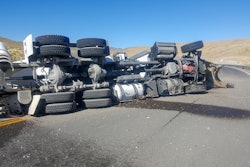Trucking news and briefs for Thursday, April 4, 2024:
FMCSA requesting approval to amend Safe Driver Apprenticeship Program
The Federal Motor Carrier Safety Administration is seeking emergency approval from the White House Office of Management and Budget to amend the Safe Driver Apprenticeship Program to keep the agency compliant with the Consolidated Appropriations Act of 2024, passed last month.
The spending bill included language that bars FMCSA from requiring the use of inward facing cameras or requiring a motor carrier to register an apprenticeship program with the Department of Labor as a condition for participation in the SDAP program. Those changes were sought in hopes of boosting participation in the program, which has been marred since it began by low participation. As such, the application and monthly report forms for the program have been revised to remove those two elements as mandatory requirements.
SDAP, a three-year program will help individuals aged 18 to 20 explore interstate trucking careers, has been plagued by low participation since its 2022 launch. Currently, only 29 fleets are registered to participate (the Biden administration expected upwards of 1,000). The apprenticeship program was capped at 3,000 participating drivers at any one time but, to date, only three dozen have enrolled.
FMCSA noted that it will continue to ask carriers whether they use inward facing cameras and whether they have a Registered Apprenticeship program approval number, and will give carriers the option of providing that information.
The OMB has to approve the change to FMCSA’s information collection request (ICR) for it to take effect. FMCSA requested approval of the change by April 15.
[Related: Spending bill retools under-21 pilot rules]
Teamsters ousted at Dependable Highway Express location
Following a majority-backed petition to remove the Teamsters union, employees at Los Angeles-based trucking company Dependable Highway Express, a subsidiary of Dependable Supply Chain Services (CCJ Top 250, No. 141), ousted Teamsters Local 63 union officials from their workplace.
John Cwiek, the employee who led his coworkers in the effort to remove the union, received free legal aid from the National Right to Work Legal Defense Foundation.
Cwiek filed a union decertification petition in March, asking the National Labor Relations Board (NLRB) to hold a vote at his workplace to determine if the Teamsters union should continue its control over Dependable Highway Express employees. The NLRB is the federal agency responsible for enforcing federal labor law, which includes administering elections to install and remove unions.
Cwiek’s petition contained signatures from a nearly 2-1 majority of employees at Dependable Highway Express’ Ontario, California, location, far more than the 30% needed to trigger a vote under NLRB rules. However, before the NLRB could hold a decertification vote, Teamsters officials filed a “disclaimer of interest” announcing they were ending their “representation” of the work unit.
Following the disclaimer, Cwiek and his coworkers are no longer represented by the Teamsters.
Before being ousted, according to the National Right to Work Legal Defense Foundation, Teamsters union officials stirred tension in the workplace by threatening Cwiek, who in January sent letters to his coworkers containing publicly-available Department of Labor data on Teamsters bosses’ salaries. In retaliation for Cwiek sending the letters, a union official appeared at Cwiek’s workplace the next day, made accusations against him, and threatened that Cwiek wouldn’t be working at Dependable Highway Express by the next contract period.
These types of threats are illegal under the National Labor Relations Act (NLRA), which protects employee speech critical of union officials, and protects employees’ right to refrain from union activities if they so choose. With Foundation aid, Cwiek separately filed federal charges against Teamsters Local 63 in February over this behavior. That charge was dropped following the union’s disclaimer of interest, and Cwiek remains employed at Dependable Highway Express.
[Related: Yellow's $137M lawsuit against Teamsters dismissed]
Cover Whale expands liability insurance offerings
Cover Whale Insurance Solutions, an insurtech specializing in connected insurance for commercial auto insurance, is continuing its expansion across the United States, expanding the availability of its auto liability coverage for truckers and fleets in six additional states: Maine, Montana, Nebraska, North Dakota, South Dakota and Vermont.
With this expansion, Cover Whale now offers auto liability coverage in 39 states. Accounting for its other lines of coverage, including auto physical damage, motor truck cargo, non-trucking liability, and truckers’ general liability, the company’s footprint extends to 46 states in all.
“Our top priority has always been to improve safety on America’s roads for everyone while providing competitive coverage options to truck drivers and fleets across the country,” said Dan Abrahamsen, CEO of Cover Whale. “Being able to write auto liability coverage in nearly 80% of the states, and other lines in more than 90% is quite the achievement for Cover Whale. And we’ll be adding more.”
The company said its user-friendly online platform allows agents to quickly and easily quote and bind coverage for their clients, streamlining the insurance buying process. Earlier this year, the company added electronic logging devices to its Driver Safety Program as an option for telemetry data-sharing, along with its dash cam option, giving policyholders additional flexibility when binding auto liability coverage.
[Related: Where transportation fleets are leveraging data analytics to improve risk management]










